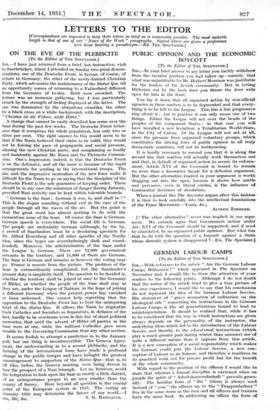LETTERS TO THE EDITOR
[Correspondents are requested to keep their letters as brief as is reasonably possible. The most suita'de length is that of one of our "News of the Week " paragraphs. Signed letters are given a preference over those bearing a pseudonym.—Ed. THE SPECTATOR.]
ON THE EVE OF THE PLEBISCITE
[To the Editor of THE SPECTATOR.]
SIRS I have just returned from a brief, but instructive, visit- to Saarbrficken, where I attended on Sunday two great demon- strations, one of the Deutsche Front, in favour, of course, of return to Germany, the other of the newly-formed Christian Party, which advocates the maintenance of the Status Quo till an opportunity comes of returning to a Fatherland different from the Germany of to-day. Both were crowded. The former was an immense gathering, but I was particularly struck by the strength of feeling displayed at the latter. The one was dominated by the ubiquitous swastika, the other by a black cross on a white background, with the inscription, " Christus ist die Fithrer, nicht Hitler."
A change that cannot be easily described has come over the Saar during the past few weeks. The Deutsche Front reiter- ates that it comprises the whole population, less only two or three per cent. The right answer to this would seem to be that if the Nazis believed their claim to be valid, they would not be forcing the pace of propaganda and social pressure, abusing the new Christian party, and complaining so loudly and insistently against Mr. Knox and the Plebiscite Commis- sion. One's impression, indeed, is that the Deutsche Front is on the defensive, and all the more so because of the rapid arrangements for sending in the international troops. The size and the impressive neutralism of the new force make it difficult for the Nazis to go on saying that the discipline of the Deutsche Front is the sole guarantee of keeping order. There should be in any case the minimum of danger during January, ' provided Nazi activity can be kept within tolerable bounds.
" German is the Saar ; German it was, is, and shall be I " This is the slogan sounding without end in the ears of the people through all the waves of the air. But the point is that the great word has almost nothing to do with the momentous issue of the hour. Of course the Saar is German. German speech is everywhere. The social life is German. The people are undeniably German (although, by the by, a crowd of Saarlanders must be a desolating spectacle for Dr. Alfred Rosenberg and all other apostles of the Nordic idea, since the types are overwhelmingly dark and round- headed). Moreover, the administration of the Saar under the League is German. There are 12,000 government servants in the territory, and 11,800 of them are German. The Saar is German and remains so however the voting may go. France is remote from the picture. The problem of the Saar is extraordinarily complicated, but the Saarlander's' present duty is simplicity itself. The question to be decided is, whether the territory shall be joined at once to 'the Germany of Hitler, or whether the people of the Saar shall stay as they are, under the League of Nations, in the hope of joining a different Germany when the present power has vanished or been redeemed. One cannot help regretting that the opposition to the Deutsche Front has to bear the uninspiring label of the Status Quo. It allows the Nazis to stigmatize their Catholics and Socialists as Separatists, in defiance of the fact, hardly to be overborne even in this day of short political membries, that until the advent of. Hitler all parties in the Saar were at' 'one, while the militant Catholics gave more trouble to the Governing Commission than any other section.
It seems foolish to attempt a prediction as to the January poll, but one 'thing is incontrovertible. ' The Geneva Agree- ment, the understanding_ as to a second plebiscite, and the forming of the international force have made a profound change in the public temper and have brought the greatest encouragement to supporters of the Status Quo—that is, to all who, before the Geneva meeting, were being driven to face the prospect of a Nazi triumph. Let us, however, avoid the temptation to look upon the Saar as merely a little district, of an unimportance proper to an area smaller than the County of Surrey. Here. beyond all question is the crucial point of The European syStem ih 1935. The voting on January 18th may determine the future of our world.—I







































 Previous page
Previous page